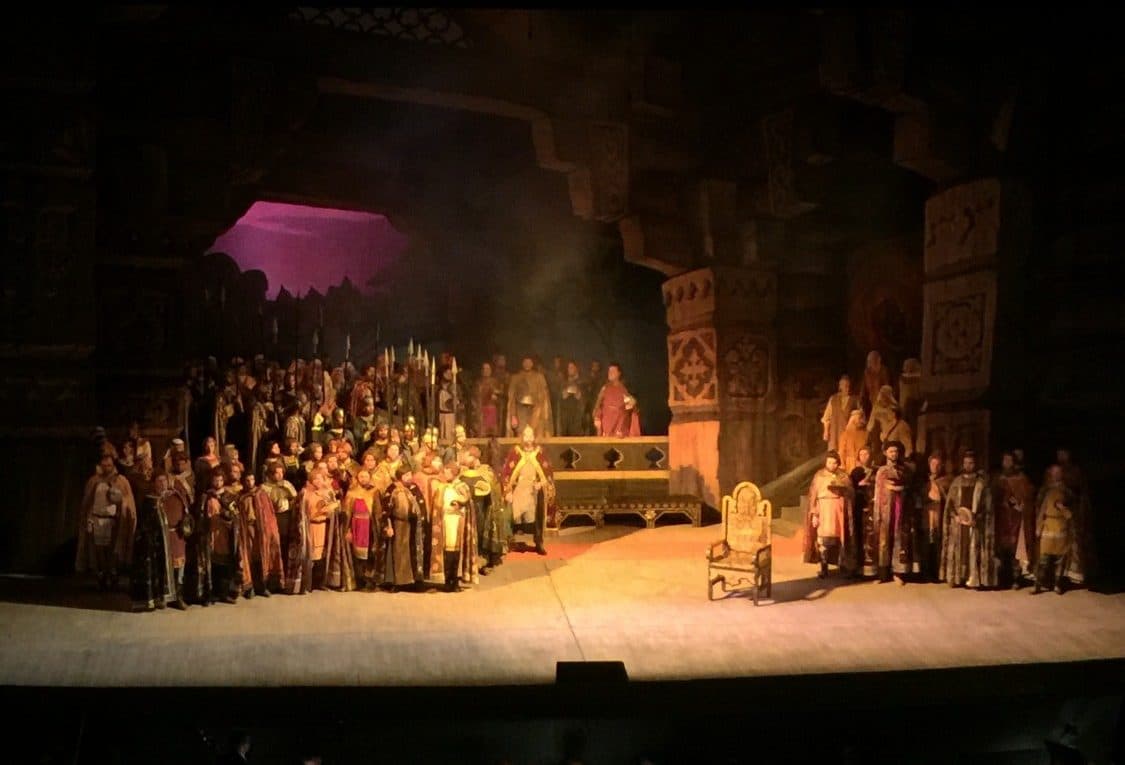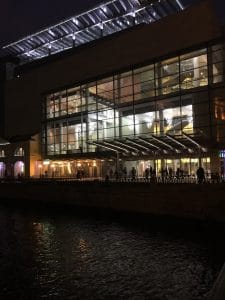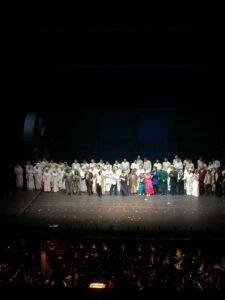I was so excited about studying abroad in St. Petersburg because I got the chance to see a lot of Russian operas that are not performed in theaters in the West. As a Russian musicologist, it was wonderful to have excess to the musical performances at the Mariinsky Theaters.
Opera is one of the most remarkable art forms that have been created in cultural history. Opera combines all the elements of the arts (music, theater, visual and performing arts) into one memorable production. Ever since Mikhail Glinka’s early success of A Life for the Tsar in 1836, the Russian School of musical composition has made an an impact on the world of opera.
Many Russian operas are not produced in the West. I wanted to hear many of the operas that I have come to love during my musicology studies of Russian musical history. I especially wanted to hear them live, with an audience of Russians and other foreigners who love them as I do.
Here are three that I can recommend to you at the historic Mariinsky Theater complex, which is in itself a must-see in St. Petersburg.
A Bit About the Mariinsky
The Mariinsky Theater itself is facinating. The main building opened in 1860, named after Empress Maria Alexandrovna, the wife of Tsar Alexander II (Mariinsky is a possesive form of Maria in Russian). From 1935 to 1992, the theater was renamed The Kirov State Academic Theater to commemorate the assassinated Leningrad Communist Party Leader, Sergei Kirov. The theater was given its original name after the fall of the Soviet Union.
It has always been recognized as a world center for ballet and opera. Although it is perhaps less famous than the Bolshoi in Moscow, it is the peer of the Bolshoi in terms of production values.
At the time I visited (2015), St. Petersburg was also marking the 70th anniversary of the Russian victory of World War II. The Mariinsky Theater, an integral part of its community, featured an art exhibition in its public spaces featuring scenes that captured not only the emotional toil the war had on the country, but also how music and other performing arts were used to increase the morale of the Soviet soldiers and people. I was also able to view pictures of the theater during the Blockade of Leningrad, which lasted from 1941-1944.
Prince Igor: 19th Century Russian Opera
The first opera that I was able to see was Alexander Borodin’s Prince Igor at the Mariinsky Theater.
Alexander Borodin (1833-1887) was not only a composer, but he also a chemist and an amateur cellist. Borodin was a part of the Russian musical circle known as “The Mighty Handful”, which also included the composers Mily Balakirev, Modest Musorgsky, and Nikolai Rimsky-Korsakov. These composers wanted to create musical works based on Russian folk musical traditions and the musical traditions of the Russian Orthodox Church. They were opposed to the Western style of musical composition, which they felt was mechanical and outdated.
Prince Igor is based on the Old Russian epic The Tale of Igor’s Campaign. Borodin adapted the libretto himself. The opera was unfinished at the time of his death in 1887 and was finished by Nikolai Rimsky-Korsakov and Alexander Glazunov. It premiered at the Mariinsky Theater in 1890.
The basic plot is that Prince Igor Sviatoslavich goes off to defend Rus (ancient Russia) from a Polovtsian tribe. Khan Konchak, the Polovtsian leader, captures Prince Igor but he eventually escapes. While Prince Igor is away at war, his wife’s brother, Vladimir Yaroslavich, claims he is now the new prince. However, Prince Igor returns to gather a new army to continue his fight against the Polovtsian leader. The opera is very patriotic, highlighting the determination of a Russian leader to ward off enemies and protect his homeland. This is one of the reasons for its popularity in Russia. Music from this opera was used in the Opening Ceremony of the Winter Olympics in Sochi.
The production of Prince Igor was amazing, but I did notice some changes to the opera. The original opera is in four acts with a prologue. The production I saw was in two acts with a prologue. Even with this change, the opera running time was three hours and forty-five minutes, with one intermission. They also used the overture as music for the set change between the prologue and Act I. Usually the overture is the first music one hears at the beginning of an opera. However, this did not affect the storyline or the flow of the opera. What I have always loved about Prince Igor are the beautiful set designs and the costumes showing the garb of the ancient Russians. Everything was very colorful and the lighting added to the emotions of the music and dancing. After seeing this production, I could not wait to experience more operas based on Russian themes here in St. Petersburg.
Watch Prince Igor (in three parts) for free:
The Oprichnik: 19th Century Russian Opera
Pyotr Tchaikovsky (1840-1893) is the Russian composer who first got me interested in the Russian School of music, which set me on my path to becoming a musicologist. I was introduced to his music as a young girl and I am still discovering his music to this day. The year I studied abroad (2015) marked the 175th anniversary of the birth of Tchaikovsky and to celebrate, the Mariinsky Theater premiered a new production of his opera The Oprichnik.
I had never heard the music to this opera and I was so excited that I would be attending the world premiere of this new production. Once again, I would get the chance to see Valery Gergiev conduct an opera.
Tchaikovsky made his Mariinsky debut with The Oprichnik. However, this Tchaikovsky opera had not been staged at the Mariinksy Theater since 1917. You can judge for yourself why the Communists might not have approved of the opera by the synopsis I’ll give below.
The opera is based on a stage play, a tragedy of the same name by Ivan Lazhechnikov (1782-1869). Tchaikovsky adapted the liberetto himself and worked on the opera from February 1870 to March 1872, using music from his earlier failed opera The Voyevoda (1869).
The basic plot revolves around the oprichniki, the personal guards of Tsar Ivan IV (the Terrible). Ivan IV abdicated the throne because of treason from the boyars and the clergy. However, the boyars were unable to rule in his absence and asked Ivan to return to the throne. He agreed to return on the condition of being granted absolute power, with the ability to execute the traitors and confiscate their estates without interference from the boyar council or the Church.
Amazingly, the boyars accepted Ivan IV’s demands. Ivan formed the oprichniki, a sort of secret police, who were then able to coordinate a reign of terror. They owed their allegiance and status to the Tsar and not to heredity and local bonds. The oprichniki were given the estates that were confiscated and they were not accountable for their actions. Their only responsibility was to protect the tsar and do his bidding.
I was always interested how an opera based on this time period would translate on the stage and once again Tchaikovsky proved his musical genius. I was surprised by how well the storyline flowed between the acts, focusing more on the love story of the two young characters and the betrayal of a son to his mother than the role of the oprichniki. It was also interesting to see an opera staged on the Mariinsky Theater Concert Hall stage, rather than the regular main stage.
I enjoyed The Oprichnik so much that I brought another ticket to see it again.
Listen to The Oprichnik Yourself:
Dead Souls: 20th Century Russian Opera
Ever since I saw Alban Berg’s opera Wozzeck, I have become a huge fan of 20th century opera. Some of my favorite 20th century operas include a diverse range from George Gershwin’s Porgy and Bess to Shostakovich’s The Nose and Lady Macbeth of the Mtsensk District. For me, operas that were composed in the 20th century not only included the new musical techniques of the century, but many of them portrayed the human psychology of the time.
I was interested to see Rodion Shchedrin’s opera Dead Souls at the Mariinsky II (the new stage) because I have never heard any of his music.
Rodion Shchedrin was born in Moscow in 1932. His father was a composer and taught music theory. Shchedrin studied at the Moscow Choral School and graduated from the Moscow Conservatory in 1955. He married the well-known ballerina, Maya Plisetskaya, in 1958. Besides being an accomplished composer, Shchedrin was a virtuoso pianist and organist. He received the USSR State Prize in 1972, the Lenin Prize in 1984, and the Russian State Prize from Boris Yeltsin in 1992. In 1989, he became a member of the Berlin Academy of Arts.
As a Russian musicologist studying in St. Petersburg, I wanted to experience music that I have never heard before and see musical productions that I have never seen. Dead Souls was a great choice for me because the opera is based on a work by one of my favorite Russian authors (Nikolai Gogol) and was conducted by one of my favorite conductors (Valery Gergiev).
The opera, Dead Souls, is in three acts with the libretto being written by the composer himself. Dead Souls by Nikolai Gogol (1809-1852) provides its plot. Gogol’s novel, published in 1842, was a political satire that skewered life in provincial towns in the 1840s. Shchedrin’s opera, composed in 1976, premiered in 1977 at the Bolshoi Theater Chorus and Orchestra in Moscow. Rodion Shchedrin is one of several Russian composers who used the works of Gogol as subjects for operas. Modest Mussorgsky, Nikolai Rimsky-Korsakov, Pyotr Tchaikovsky, and Dmitri Shostakovich all composed operas based on the works of Gogol.
I was really impressed by Dead Souls, not only with the music and the singing, but the production and stage design. This opera reminded me of Shostakovich’s opera The Nose. Both highlight the satirical aspects of Gogol’s works and even though the topics may have a serious nature, one cannot help but laugh at the silliness of many of the characters. I really was struck by the music of the peasant songs, which contrasted strongly with the more modern music used in the opera.
The best thing about seeing this opera is that it made me want to listen to more music composed by Rodion Shchedrin, the first living composer I’ve been able to see staged.
Watch Dead Souls for Yourself:
You Might Also Like
(includes current article)

A Musicologist Recommends Three Russian Operas for You to Watch at the Mariinsky
I was so excited about studying abroad in St. Petersburg because I got the chance to see a lot of Russian operas that are not performed in theaters in the West. As a Russian musicologist, it was wonderful to have excess to the musical performances at the Mariinsky Theaters. Opera is one of the most […]








